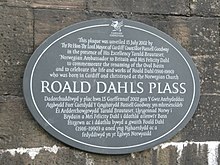Roald Dahl Plass

Roald Dahl Plass is a public space in Cardiff Bay, Cardiff, Wales. It is named after Cardiff-born author Roald Dahl,[1] and is located on the coast along the south of the city centre. The square is home to the Senedd building housing the Senedd, the Welsh parliament, and the Wales Millennium Centre, a performing arts centre. The bowl-like shape of the space has made it a popular amphitheatre for hosting open-air concerts.[1]
Formerly named the Oval Basin and known as the Bowl, the area was one of the docks for a thriving coal port during the latter half the 19th century and much of the 20th century. Following World War II, the space entered a period of decay and dereliction until the 1980s, when the Cardiff Bay area was regenerated.[2]
The name acknowledges the writer's roots (both of Dahl's parents were from Norway) and the Norwegian seafarers' church which stands nearby. "Plass" is the Norwegian cognate of the English word "place"; in this context the word means square.
History
[edit]
The area originally comprised wetlands owned by John Crichton-Stuart, 2nd Marquess of Bute. He was persuaded to finance construction of the dock on his land at a cost of over £ 350,000. The dock opened under the name "West Bute Dock" on 8 October 1839, and was over 1400 yards (1280 m) long and 200 feet (60 m) wide, allowing 300 vessels to berth at any time.[2]
The dock was joined by four others: East Bute Dock, Roath Basin, Roath Dock and Queen Alexandra Dock. Cardiff became the largest exporter of coal in the world; in 1913, the city exported 10,700,000 tonnes of coal.[3] However, the Great Depression, Second World War and cheap foreign competition all caused great damage to the Welsh coal mining industry, with the last coal export through the dock taking place in 1964. The dock was filled in to prevent collapse of the surrounding walls.[1]
Design features
[edit]Oval Basin
[edit]
The Oval Basin was designed by the artist William Pye in conjunction with Nicholas Hare Architects, and opened in April 2000.[4][5][6] A plaque was unveiled on 13 July 2002 to commemorate its renaming to Roald Dahl Plass.
Roald Dahl Plass is today an oval-shaped open space surrounded by illuminated pillars and gravel covering over the original dock area.[1] The Plass was a central part of Cardiff's bid for European Capital of Culture status for 2008, although it ultimately lost the bid to Liverpool.[1]
Water Tower
[edit]
At the north end of the plass is the Water Tower, which is approximately 70 feet (21 m) high with an intermittent stream of water running down the metallic fountain. The tower was also designed by Nicholas Hare Architects[5] in conjunction with the sculptor, William Pye.[7]
Doctor Who and Torchwood
[edit]Roald Dahl Plass, especially the Water Tower, has featured prominently in the BBC television drama Doctor Who and its spin-off, Torchwood. Roald Dahl Plass' first appearance is in the episode "Boom Town". In the show's universe, a "spatial-temporal" rift runs through Cardiff, a feature that the Ninth Doctor uses as a fueling station for his TARDIS.
In Torchwood, the fictional Torchwood Institute has one of its headquarters, Torchwood Three, based under the square, to monitor alien activity through the rift. The base of the fountain can be seen passing through the building, and one of the paving tiles in the square is a decoy which hides an "invisible lift" leading down to the base.[8] This base was effectively destroyed in Torchwood: Children of Earth but Roald Dahl Plass was seen briefly at the end of the first episode of Miracle Day.
Due to the Water Tower's prominence in the series, it is sometimes referred to as the "Torchwood Tower", with postcards having been published using that name.[9][10]
Festivals and events
[edit]Roald Dahl Plass is often used to host concerts and other cultural events, such as the Cardiff Food Festival. In August 2018 it was central to the 'no fence' National Eisteddfod, with stalls and an open-air music stage. The Gorsedd Ceremony took place in the square on the Monday and the Friday.[11]
Views of Roald Dahl Plass
|
|---|
See also
[edit]References
[edit]- ^ a b c d e "Dahl name docks at Cardiff Bay". BBC News. 13 July 2002. Retrieved 24 October 2006.
- ^ a b "Roald Dahl Plass". BBC Wales. Archived from the original on 14 September 2007. Retrieved 24 October 2006.
- ^ Cardiff Bay, Urban75. Retrieved 24 October 2006
- ^ "Public Art, The Water Tower". Cardiff Harbour Authority. Archived from the original on 21 August 2009. Retrieved 6 September 2009.
- ^ a b "Public art in and around Cardiff Bay". Cardiff Harbour Authority. Archived from the original on 23 December 2012. Retrieved 12 March 2008.
- ^ "Oval Basin". Nicholas Hare Architects LLP. Archived from the original on 20 March 2015. Retrieved 12 March 2008.
- ^ "Cardiff Public Art Register" (PDF). Cardiff Council. 2011. p. 51. Retrieved 25 January 2015.
- ^ James, David (17 April 2006). "Dr Who spin-off based in Bay". South Wales Echo.
- ^ Schofield, John, ed. (2014), Who Needs Experts?: Counter-mapping Cultural Heritage, Ashgate Publishing, p. 215, ISBN 978-1-4724-0178-6
- ^ "Talks held over Torchwood exhibit". BBC News. 8 June 2009. Retrieved 25 January 2015.
- ^ Jenny White, Nathan Bevan (31 July 2018). "National Eisteddfod Cardiff 2018 what's on, tickets, how to get there, parking, camping, road closures". Wales Online. Retrieved 11 August 2019.
External links
[edit] Media related to Roald Dahl Plass at Wikimedia Commons
Media related to Roald Dahl Plass at Wikimedia Commons- Roald Dahl Plass on Google Maps






